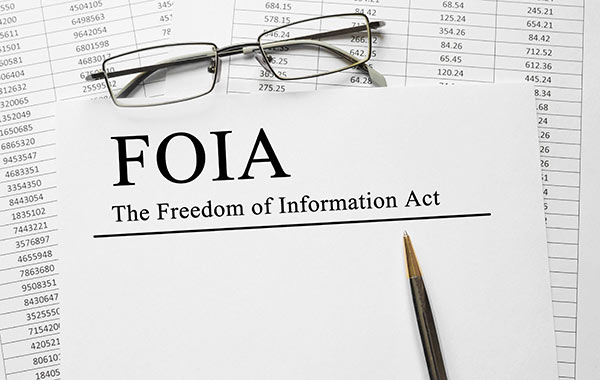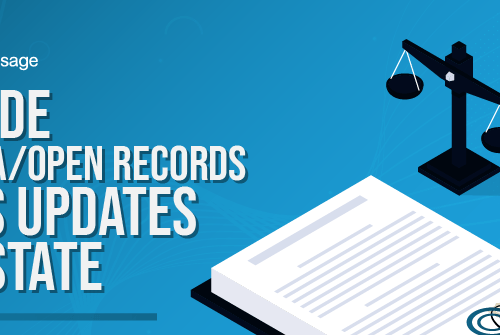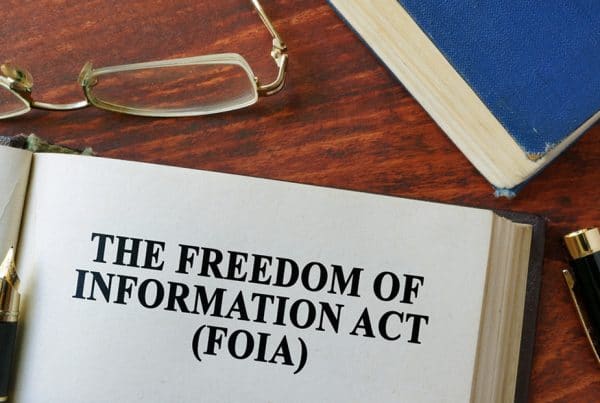Government text archiving is one of the most important aspects of complying with various Freedom of Information Acts (FOIAs).
As one of the most important tools the public has for furthering government transparency, it is critical for public agencies to effectively capture, maintain, and produce public records in a timely manner to avoid backlash from the public and lessen the risk for disruptive and expensive FOIA lawsuits.
In this infographic we discuss the latest challenges and trends in public sector text messaging and FOIA.

1. Lack of BYOD Retention Policies Still a Weak Point
The adoption of BYOD culture in public sector over the past few years has been a significant turning point in the FOIA landscape. One can recall that in 2012, the White House even released a BYOD toolkit to help agencies implement such policies as part of the Digital Government Strategy.
However, despite the efforts to streamline the adoption of BYOD in public sector, a significant number of agencies are still facing difficulties managing BYOD devices in their workplace. According to statistics, two-thirds of public organizations allow their employees to use their personal devices for official business, yet only 35% of them are retaining SMS/Text messages.
While adopting the BYOD culture has repeatedly been said to be effective in improving employee productivity, it also presents risks that may hamper public agencies from complying with FOIA laws and Sunshine Laws.
Failing to establish a clear text messaging policy that includes the retention of SMS messages on personal devices not only puts public agencies at risk of breaching FOIA but also exposes them to various security threats which can ultimately lead to leaks of critical government information.
2. More Agencies Failing to Respond to FOIA Requests
Over the years, FOIA requests and litigation have led to critical revelations regarding government actions and, in some cases, abuses. In 2017, FOIA litigation increased 26% over the previous year. In 2018, this number is expected to increase even further.
What makes this trend more alarming is that the US is setting records for censoring government. Research from Associated Press finds that the government has censored and withheld federal records sought by citizens more regularly in 2017. Reportedly, 78% of 823,222 requests last year yielded only censored files or nothing at all.
Federal agencies also spent $40.6 million in legal fees in 2017 to defend their decision to withhold public records. That includes the recent case between the New York Times and the CIA, wherein the former was awarded $51,910 in a lawsuit over records about chemical weapons in Iraq.
According to Adam A. Marshall, attorney at the Reporters Committee for Freedom of the Press, federal agencies are failing to leverage modern technology to store, locate, and produce records to respond to FOIA requests, which ultimately puts the public at the losing end.
Without the right archiving platform to capture and archive public records such as text messages, we can expect that many public agencies to follow this disturbing trend in the years to come.
3. Increasing Appeal to Exempt Personal Devices from FOIA
Perhaps due to the challenges presented by BYOD devices, lawmakers across the country propose to exclude personal devices from open records requests. In a recent report, Republican leaders in Kentucky proposed to amend the House Bill 302 to say that phone calls, text messages, and emails – regardless if work-related or not – would not be considered to be public records.
This, however, is not the first case wherein the state government choose to exempt itself from Open Records acts. In January 2018, Arizona lawmaker Rep. Bob Thorpe also proposed that any records stored on an individual’s personal device or social media be exempted from open records requests.
While the proposed amendment to Kentucky HB 302 didn’t get enacted, and that most Arizona lawmakers think that the proposed bill will also not be legislated, the mere fact that there are lawmakers who would prefer to bypass the FOIA is a threat to the public’s right to know.
4. New Public Records Initiatives and Policies to Ensure FOIA Compliance
While there are lawmakers trying to circumvent the FOIA, new initiatives and policies from different authorities are also being introduced and implemented. The Tallahassee City Commission, for instance, has adopted new public records policies in March 2018 after the city was sued by the Tallahassee Democrat.
According to the suit, the Democrat sued the city’s former manager Rick Fernandez deleted text messages that showed he asked lobbyist for expensive skybox tickets to a football game in 2016. The suit also stated the city staff failed to preserve the business-related messages.
Resulting from the lawsuit, the commission was ordered by the court to adopt several new public records policies, including a ban on employees conducting city business by text message, unless those messages are captured and archived by the city.
Overall, these challenges and trends in public sector text messaging should be more than enough that the public sector needs to adopt a retention policy and invest in an archiving platform to effectively meet the FOIA requirement.
With a good mobile messaging archiving solution, the preservation of email, social media, instant messaging, text messaging, and other forms of digital correspondence becomes more manageable and efficient. Only by employing robust and comprehensive technology can government offices be prepared for litigation and remain compliant with federal and state regulations.




